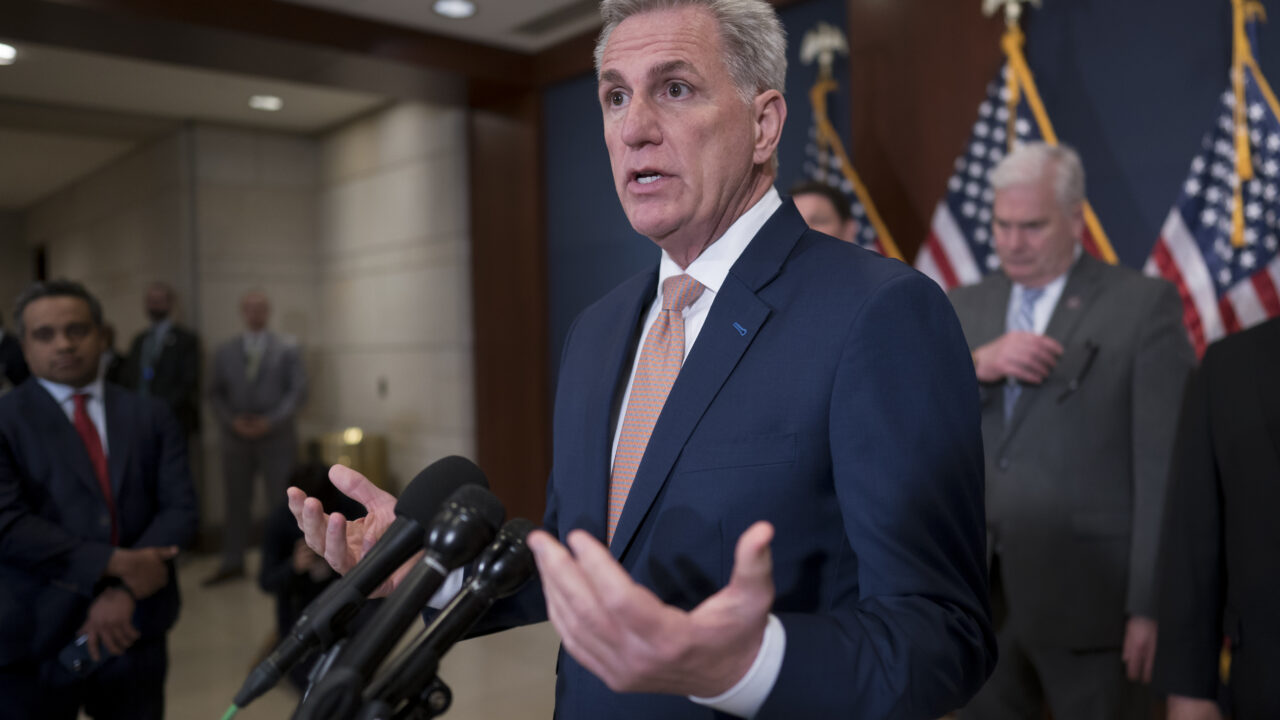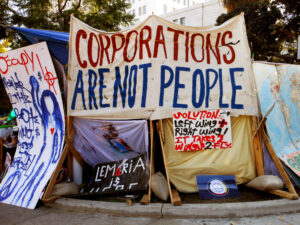Why Is ESG Under Attack by Republicans?
ESG is called “woke capitalism” by the right and “greenwashing” by the left. But to most investors, it’s just common sense. Speaker of the House Kevin McCarthy. Photo: J. Scott Applewhite / AP.
Speaker of the House Kevin McCarthy. Photo: J. Scott Applewhite / AP.
A once-obscure financial term is now at the center of a Republican “anti-woke” crusade.
On Monday, President Biden issued the first veto of his presidency on a measure that would have overturned a Labor Department rule allowing retirement fund managers to consider environmental and social impacts when making investment decisions. The strategy is more widely known as ESG: a shorthand for environmental, social, and governance criteria investors can use to evaluate which companies to buy shares in.
The vetoed resolution, led by congressional Republicans, is the latest in a series of attacks against what GOP lawmakers call “woke capitalism.” Since 2021, Florida, Texas, Louisiana, South Carolina, and several other red states have pulled billions in state funds out of BlackRock and other investment firms that support ESG. At least seven Republican-controlled states have enacted policies and 13 others have introduced bills to prohibit applying ESG principles in state investments like public pensions.
The rancor will likely continue through the 2024 presidential election. Republican hopefuls Florida Governor Ron DeSantis, former Vice President Mike Pence, and “anti-woke” entrepreneur Vivek Ramaswamy have all taken prominent anti-ESG stances.
ESG has come under fire by progressives as well, who accuse firms self-reporting ESG data of greenwashing. But despite all the political controversy, ESG is quite mainstream among the people who actually use the strategy: investors.
ESG has been relatively uncontroversial among investors from the very beginning—in part because the term was co-created by investors.
A 2021 survey by the fund manager Natixis found that 72 percent of institutional investors implement ESG. Companies are responding to investors’ interest, with close to 90 percent reporting some ESG data to shareholders, according to a recent survey of executives of large U.S. publicly traded businesses. And as of early 2022, $8.4 trillion in U.S. assets were held by financial firms that employ ESG decision-making.
Perhaps most tellingly, BlackRock CEO Larry Fink has promoted the importance of ESG standards in his annual letter to CEOs since 2017—a particular point of grievance for Republicans. The yearly note from the world’s largest asset manager is highly influential among corporate executives and investors.
Kirsten Snow Spalding, vice president of the investor network at the nonprofit Ceres, leads a network of more than 220 financial institutions managing over $60 trillion in assets. She says that the vast majority of investors she works with see ESG integration as just plain common sense.
“You meet these analysts, right? These are not, you know, crazy progressive. These are really major folks who are good at their jobs,” she said.
In fact, ESG has been relatively uncontroversial among investors from the very beginning—in part because the term was co-created by investors. The abbreviation first appeared in a 2004 report jointly developed by the United Nations Global Compact, a voluntary corporate sustainability initiative, and a group of 23 major financial institutions. The participants—Goldman Sachs, HSBC, Credit Suisse, and Morgan Stanley, to name a few—are not exactly what come to mind when you think of radical liberals.
One reason for ESG’s acceptance among investors is its explicit alignment with the traditional investing goal of maximizing returns. While the original 2004 report paid lip service to the societal case for sustainable development, the report authors put a greater emphasis on the business case for considering ESG risks, argues Elizabeth Pollman, a professor at the University of Pennsylvania Carey Law School.
In theory, investors apply ESG criteria because they recognize that environmental and social impacts like climate change will materially affect a company’s profits in the long run. As Spalding puts it, screening for ESG-related data and risks is how “we ensure investors are able to, working through capital markets, produce long-term wealth for people.” But in practice, the data is mixed on whether using ESG criteria actually maximizes returns.
The difficulty in evaluating ESG lies in the lack of a standardized definition for the term. One of the biggest misconceptions about ESG, according to sustainable finance expert and Yale professor Cary Krosinsky, is that it’s a singular idea—a ready-to-use adjective we can plunk in front of any financial term we see fit, like ESG investing or ESG firms. But ESG is not a fixed, technical concept. It’s more like an umbrella that combines three separate but related sets of issues.
Critics say that ESG funds—and the ratings that underlie them—make misleading claims about their social and environmental impact, and distract from the more urgent work of climate regulation.
The expansiveness of ESG is part of the reason for its success. Different actors, from asset managers to companies to insurance firms, mold ESG’s definition, methodology, and application to best fit their individual needs. Gabriel Thoumi, CEO of the ESG integration consulting firm Responsible Alpha, compares ESG to a bakery, with “various breads, donuts and pastries that come out of that bakery.”
For instance, there are more than 600 ESG rating firms, which score companies based on their environmental, labor, and governance practices. Each uses its own methodology and, as a result, they tend to come up with different ratings. Investors can also buy products called ESG funds, which pool together stocks from dozens to thousands of companies according to ESG ratings and other environmental and social metrics.
Critics say that ESG funds—and the ratings that underlie them—make misleading claims about their social and environmental impact, and distract from the more urgent work of climate regulation. A Bloomberg analysis of the world’s largest ESG rating company, MSCI, found that the firm only measured risks to companies, rather than environmental and social risks to society. “Fighting climate risks in financial portfolios is not the same thing as fighting climate change itself,” wrote Tariq Fancy, a prominent ESG critic and former CIO for sustainable investing at BlackRock.
“Green investing is actively harmful because it’s influencing public opinion and lowering the likelihood of regulation,” he told The New Republic.
On the right end of the spectrum, lawmakers in red states from Florida to Texas argue that incorporating ESG limits returns for retirees. But so far, evidence points to the opposite. A fiscal analysis by the Kansas state budget office found that pending anti-ESG legislation would cut pension returns by $3.6 billion over the next decade. In Indiana, losses would amount to $6.7 billion over the same timeframe. And in Texas, researchers found a recently enacted anti-ESG law cost taxpayers an estimated $302 million to $532 million in interest over eight months.
“If you limit the pool of asset managers who are available, it is very costly to taxpayers and pensioners,” said Spalding. As far as whose interests are being served by such policies, “It’s certainly not the pension participants or the taxpayers in these states,” said Spalding.
Supporters say that new requirements will hopefully lead to improved data and greater credibility for ESG metrics.
Some political analysts claim the anti-ESG push is simply a highly orchestrated attempt to please Republican donors. At the heart of the issue is the perceived threat ESG poses to the oil and gas industries. It seems that the more companies and investors recognize the need to transition away from fossil fuels, the more ESG opponents have ramped up efforts to protect the oil and gas sector — a huge source of lobbying money for the Republican party.
Millions in funding for the anti-ESG movement have been traced back to deep-pocketed conservative sponsors. The Wall Street Journal reports that a right-wing nonprofit overseen by Leonard Leo, a leader at the conservative Federalist Society, has spent more than $10 million on anti-ESG action. And major right-wing groups including the Heritage Foundation and the American Legislative Exchange Council, better known as ALEC, have played a leading role in pushing model anti-ESG legislation.
Yet even while efforts to topple ESG pile up, the strategy is becoming increasingly codified in domestic and international regulations. Last March, the Securities and Exchange Commission, the federal agency that regulates publicly traded companies, released a draft climate disclosure rule that would require companies to report on greenhouse gas emissions and other climate-related impacts and risks. At the global level, the International Sustainability Standards Board, an independent standard-setting body, is on track to finalize similar guidelines for financial reporting on climate and other ESG-related issues by this June.
Supporters say that new requirements will hopefully lead to improved data and greater credibility for ESG metrics. “When we see an asset manager saying, ‘I’ve got an ESG fund or a net-zero fund or a green fund,’ there have been a lot of criticisms about, well, wait a minute, what does that really mean?’” said Spalding. “I do think that we will, over time, see stricter definitions and greater transparency.”
Your support matters…Independent journalism is under threat and overshadowed by heavily funded mainstream media.
You can help level the playing field. Become a member.
Your tax-deductible contribution keeps us digging beneath the headlines to give you thought-provoking, investigative reporting and analysis that unearths what's really happening- without compromise.
Give today to support our courageous, independent journalists.






You need to be a supporter to comment.
There are currently no responses to this article.
Be the first to respond.